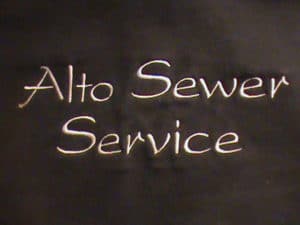
Here is a list of the most common causes of drain clogs and how to help prevent your drains from clogging.
Main Sewer Lines
Tree Roots- Your main sewer line that runs from the house to the city sewer or septic tank can often have tree roots in them that will grow large enough to clog the pipe and can cause sewage to backup into your house. Sewer backups are easily avoided. Here's how:
- Have your sewer cleaned every 1-2 years to remove the tree roots. Keep in mind, the roots WILL eventually grow back so annual maintenance is highly recommended to keep the pipe open for drainage. Our preventative cleaning will also remove the scale and rust from the inside walls of the pipe for better flow.
- Be careful what you flush! Feminine hygiene products and flushable wipes will get hung up on the roots! These items should be disposed of in the trash not flushed down the toilet.
- We can run a camera down your sewer to see where the roots are growing in, make sure the pipe is flowing properly, and determine the general overall condition of the pipe.
Kitchen Sink
Grease and garbage disposal overload are the two most common reasons that a kitchen sink will clog. To avoid these types of clogs we recommend:
- Never pour grease down the kitchen sink. Grease should be collected in a container and when it solidifies it should be thrown away or recycled.
- Garbage disposals are not meant to be used for dumping out leftovers from last night’s dinner. Garbage disposals are made for table scraps and small amounts of food waste. When using the disposal, run hot water and slowly put the waste down making sure you are not over loading it with too much at once. Keep running hot water after you run the disposal so you don't cause a backup in the pipe. Keep in mind the food needs to go from the kitchen sink to the end of your sewer line so it needs enough hot water to get it there.
- Avoid putting these items down the disposal: Grease, Noodles, Egg Shells, Coffee Grounds, Potato peelings, and Rice as these are the most common items that will cause a clogged sink.
Bathtub and bathroom sink
Hair is the most common reason for bathtub and bathroom sink clogs.
- The best way to avoid a clog from hair is to try to keep the hair out of these drains. A simple solution to this is to use a strainer to catch the hair before it goes down the drain.
Toilets
We do not recommend flushing any feminine hygiene products, wipes, paper towels, tissues, or foreign objects. Human waste and toilet paper should be the only things being flushed down the toilet.
Laundry Tubs
The best way to keep the lint out of the laundry tub pipes is to install a lint trap on the discharge hose of the washing machine.
Floor Drains
If your floor drain backs up, it can be a couple different things. A floor drain backup could be an indication that the main sewer line is backing up. Since the floor drain is one of the lowest drains in the house the sewer water usually will back up out of it first. If your floor drain backs up when you flush the toilet or take showers it most likely is the main sewer line backing up into the floor drain. In some homes the floor drain is usually connected to the kitchen sink and laundry tub before connecting to the main sewer line. The combination of these drains connected together can cause lint and grease to build up resulting in the floor drain backing up. If this is the case, you will be able to flush and shower with no effect on the floor drain.
*Please note: The floor drain is not the main line or the main drain! This is a common misconception we have heard quite often over the years. The floor drain is just a plain ol’ floor drain. The main line or main drain is the larger diameter pipe that everything in the house connects to (toilets, tubs, sinks, showers, and floor drain). Everything goes through the main line to the city sewer or septic system. We do not clean main lines from the floor drain, we clean main lines from the main clean outs.
Do the liquid drain cleaners they sell at the store actually work?
No! It is way cheaper to call us than it is to replace your pipes!
- We have seen several instances where these "Liquid Drain Cleaners" have destroyed the ceramic in sinks, burned holes in the sink baskets, discolor the pop-up drain stoppers in bathroom sinks, and eat away at pipes creating leaks and ultimately causing the need to replace the pipes.
- Rarely do they actually work, but if you must use a liquid drain cleaner, it at best can only open a small hole for the water to drain through. Since the pipe isn't getting cleaned out, it’s only a matter of time before it reseals itself and is clogged again.
- Please let us know in advance if any of these products have been used! These chemicals can cause severe burning, swelling, and blindness. Imagine what they are doing to your plumbing! We will take every precaution to protect our staff from injury from these harmful chemicals.
- WE DO NOT RECOMMEND USING THESE PRODUCTS!
